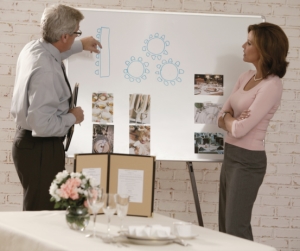Event Planning and Food Allergy Awareness
 Food typically plays a central role in celebrations, parties, meetings and conventions that are held in meeting/reception halls, convention centers, hotels or restaurants. Event planning can be complicated and often becomes more so due to the need to serve guests who have food allergies safely and professionally.
Food typically plays a central role in celebrations, parties, meetings and conventions that are held in meeting/reception halls, convention centers, hotels or restaurants. Event planning can be complicated and often becomes more so due to the need to serve guests who have food allergies safely and professionally.
Research on food allergies in eating establishments shows better communication and food allergy awareness by all people involved in the dining process is necessary. Often, patrons with known peanut or tree nut allergies who have reactions while dining did not notify the establishment of their allergy. Many of these reactions could have been avoided if the server had been made aware of the allergy.1
For the food allergic dining guest, alerting the establishment of allergies before ordering is an important first step in avoiding allergic reactions. However, although many members of restaurant staff feel confident they can safely serve guests with a food allergy, they may not have the knowledge or training to do so.2 A lack of communication coupled with false confidence is a dangerous combination. Here are some examples of possible cross contaminations that can occur if the restaurant staff does not have the appropriate knowledge or training:
• Picking nuts off a salad thinking it will be safe.
• Thinking the temperature of the fryer oil destroys allergens.
• Taking a spoon used to serve cream soup and stirring milk-free soup.
• Chopping nuts and a salad on the same block.
• Sharing mixers, pans, etc., in preparation of multiple foods.
Unlike dining at a restaurant, eating at a catered function/event is less in the control of the guest with food allergies. Event planners and caterers must be aware that they are dealing with a “captive audience”—while food allergic patrons at restaurants can choose to go elsewhere, food allergic guests at events may not have this option. In a sense many important “screening” steps and decisions may be taken out of the control of food allergic guests, including not having the opportunity to assess the food allergy knowledge and policies of the catering hall.
Another complicating factor in easily communicating allergy needs is the scale of the meal or meals being prepared and served. Many menu items served at events are pre-prepared or at least “prepped” prior to the arrival of the guests. In other words, many foods are handled or prepared without being able to prevent cross contact (a common cause of allergic reactions).
Safety depends on effective communication and partnering between the event planners, the caterers (any staff responsible for any of the food eaten by guests with food allergies), and guests. Event planners need to ask if there are attendees with food allergies and provide those food allergic attendees with opportunities to notify them of any special accommodations. This early communication can help planners, caterers and other eating establishments plan for safe alternatives when possible. It also gives guests time to work through acceptable and safe alternatives.
Additional precautions for event planners include:
• Offering a wide variety of food to accommodate all allergies and restrictions. Provide simple options that can be made from scratch for specific guests.
• Always labeling all food offerings and encouraging staff to confirm/double check for food allergens and cross contaminations. However, this requires that the caterer is extremely aware of ingredients and how meals were prepared in order to label food specifically enough to allow a food allergic consumer to eat it safely.
• Informing the catering and banquet staff who are working the event of any specific allergies so that there can be separate meals or offerings prepared in advance.
• Directly communicating any concerns, strategies, etc., well in advance of the event (i.e. if you need a clean, separate work space in the kitchen to prepare certain meals/foods).
• Reiterating and repeating concerns at every step of the planning process and in every communication.
All catering staff, which includes front of the house, back of the house, management, etc., must have protocols for dealing with food allergy, as well as thorough training. The training should include communication, label reading, knowledge of hidden ingredients, prevention of cross contact and/or cleaning techniques and processes for promptly dealing with allergic and other medical emergencies.
It is the responsibility of guests to respond to planners’ requests to alert them of their allergy needs and follow up by always alerting the server and manager about allergies upon arriving at the function. However, safe alternatives—including outside, packaged food items or a simply prepared meal arranged prior to the event—should be made available.
Guests with food allergies are valued diners. Event planners can serve them safely and professionally with the appropriate education and planning.
For more information please see our Food Allergy section.
Please note that the above article is intended to increase awareness of the need for communication and additional information when catering for guests with food allergies. The information provided is not intended to be a replacement or substitute for training necessary to safely serve those with food allergies.
1. Terence J. Furlong, MSa, Jennifer DeSimonea, Scott H. Sicherer, MDb. Peanut and tree nut allergic reactions in restaurants study. Journal of Allergy and Clinical Immunology 2001;108:867-70.
2. Ryan Ahuja, MD and Scott H. Sicherer, MDb. Food allergy management from the perspective of restaurant and food establishment personnel. Annals of Allergy Asthma Immunology. 2007;98:344–348.
12/11/2023